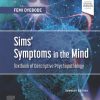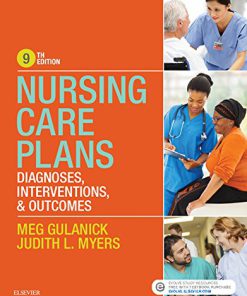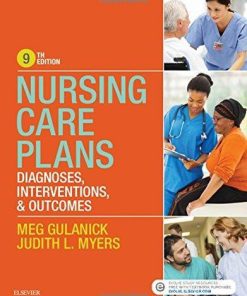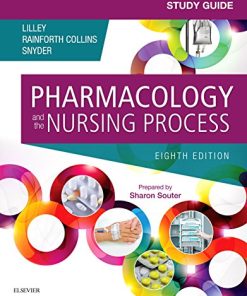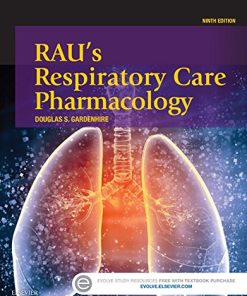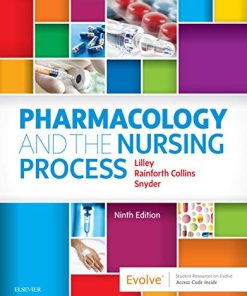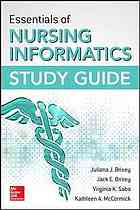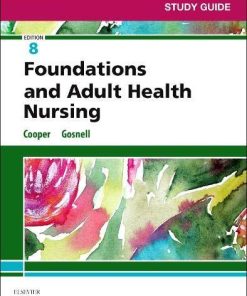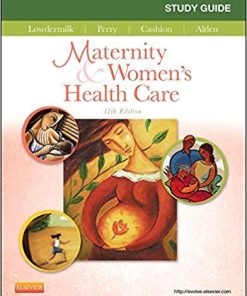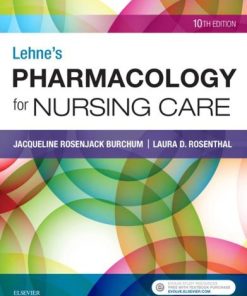Study guide Pharmacology for nursing care 9th Edition Burchum
$50.00 Original price was: $50.00.$25.00Current price is: $25.00.
Study guide Pharmacology for nursing care 9th Edition – Ebook Instant Download/Delivery ISBN(s): 9780323322591, 032332259X,0323340261, 9780323340267
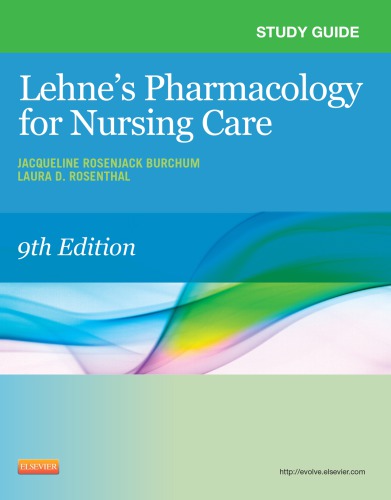
Product details:
- ISBN-10: 0323340261
- ISBN-13: 9780323340267
- Author: Jacqueline Rosenjack Burchum, Laura D. Rosenthal
Complex pharmacologic information is simple to learn with this complete study resource! Designed to accompany Lehne’s Pharmacology for Nursing Care, 9th Edition, this robust workbook features critical thinking study questions, case studies, and patient teaching scenarios that help you connect pharmacology concepts with their impact on patient care. Plus, an emphasis on priority nursing care with NCLEX examination-style review questions prepares you for success on the exam. NCLEX Examination-style questions are included in each chapter. NEW! NCLEX-style alternate format questions including prioritization questions, bolster your readiness for the NCLEX Exam while supporting review of core pharmacology content NEW! Increased emphasis on patient safety features questions on safe patient care that challenge you to select appropriate actions to prevent or remediate medication errors. NEW! Detailed rationales for all prioritization questions are included in the answer key and encompass explanations for both correct and incorrect responses.
Table contents:
1. Orientation to Pharmacology
2. Application of Pharmacology in Nursing Practice
3. Drug Regulation, Development, Names, and Information
4. Pharmacokinetics
5. Pharmacodynamics
6. Drug Interactions
7. Adverse Drug Reactions and Medication Errors
8. Individual Variation in Drug Responses
9. Drug Therapy During Pregnancy and Breast-Feeding
10. Drug Therapy in Pediatric Patients
11. Drug Therapy in Geriatric Patients
12. Basic Principles of Neuropharmacology
13. Physiology of the Peripheral Nervous System
14. Muscarinic Agonists and Antagonists
15. Cholinesterase Inhibitors and Their Use in Myasthenia Gravis
16. Drugs That Block Nicotinic Cholinergic Transmission: Neuromuscular Blocking Agents and Ganglionic Blocking Agents
17. Adrenergic Agonists
18. Adrenergic Antagonists
19. Indirect-Acting Antiadrenergic Agents
20. Introduction to Central Nervous System Pharmacology
21. Drugs for Parkinson’s Disease
22. Alzheimer’s Disease
23. Drugs for Multiple Sclerosis
24. Drugs for Epilepsy
25. Drugs for Muscle Spasm and Spasticity
26. Local Anesthetics
27. General Anesthetics
28. Opioid (Narcotic) Analgesics, Opioid Antagonists, and Nonopioid Centrally Acting Analgesics
29. Pain Management in Patients with Cancer
30. Drugs for Headache
31. Antipsychotic Agents and Their Use in Schizophrenia
32. Antidepressants
33. Drugs for Bipolar Disorder
34. Sedative-Hypnotic Drugs
35. Management of Anxiety Disorders
36. Central Nervous System Stimulants and Attention-Deficit/Hyperactivity Disorder
37. Drug Abuse I: Basic Considerations
38. Drug Abuse II: Alcohol
39. Drug Abuse III: Nicotine and Smoking
40. Drug Abuse IV: Major Drugs of Abuse Other Than Alcohol and Nicotine
41. Diuretics
42. Agents Affecting the Volume and Ion Content of Body Fluids
43. Review of Hemodynamics
44. Drugs Acting on the Renin-Angiotensin-Aldosterone System
45. Calcium Channel Blockers
46. Vasodilators
47. Drugs for Hypertension
48. Drugs for Heart Failure
49. Antidysrhythmic Drugs
50. Prophylaxis of Coronary Heart Disease: Drugs That Help Normalize Cholesterol and Triglyceride Levels
51. Drugs for Angina Pectoris
52. Anticoagulant, Antiplatelet, and Thrombolytic Drugs
53. Management of ST-Elevation Myocardial Infarction
54. Drugs for Hemophilia
55. Drugs for Deficiency Anemias
56. Hematopoietic Agents
57. Drugs for Diabetes Mellitus
58. Drugs for Thyroid Disorders
59. Drugs Related to Hypothalamic and Pituitary Function
60. Drugs for Disorders of the Adrenal Cortex
61. Estrogens and Progestins: Basic Pharmacology and Noncontraceptive Applications
62. Birth Control
63. Drug Therapy of Infertility
64. Drugs That Affect Uterine Function
65. Androgens
66. Drugs for Erectile Dysfunction and Benign Prostatic Hyperplasia
67. Review of the Immune System
68. Childhood Immunization
69. Immunosuppressants
70. Antihistamines
71. Cyclooxygenase Inhibitors: Nonsteroidal Anti-inflammatory Drugs and Acetaminophen
72. Glucocorticoids in Nonendocrine Diseases
73. Drug Therapy of Rheumatoid Arthritis
74. Drug Therapy of Gout
75. Drugs Affecting Calcium Levels and Bone Mineralization
76. Drugs for Asthma and Chronic Obstructive Pulmonary Disease
77. Drugs for Allergic Rhinitis, Cough, and Colds
78. Drugs for Peptic Ulcer Disease
79. Laxatives
80. Other Gastrointestinal Drugs
81. Vitamins
82. Drugs for Weight Loss
83. Basic Principles of Antimicrobial Therapy
84. Drugs That Weaken the Bacterial Cell Wall I: Penicillins
85. Drugs That Weaken the Bacterial Cell Wall II: Cephalosporins, Carbapenems, Vancomycin, Telavancin, Aztreonam, Teicoplanin and Fosfomycin
86. Bacteriostatic Inhibitors of Protein Synthesis: Tetracyclines, Macrolides, and Others
87. Aminoglycosides: Bactericidal Inhibitors of Protein Synthesis
88. Sulfonamides and Trimethoprim
89. Drugs Therapy of Urinary Tract Infections
90. Antimycobacterial Agents: Drugs for Tuberculosis, Leprosy, and Mycobacterium avium Complex Infection
91. Miscellaneous Antibacterial Drugs: Fluoroquinolones, Metronidazole, Daptomycin, Rifampin, Rifaximin, Bacitracin, and Polymyxins
92. Antifungal Agents
93. Antiviral Agents I: Drugs for Non-HIV Viral Infections
94. Antiviral Agents II: Drugs for HIV Infection and Related Opportunistic Infections
95. Drug Therapy of Sexually Transmitted Diseases
96. Antiseptics and Disinfectants
96. Anthelmintics
98. Antiprotozoal Drugs I: Antimalarial Agents
99. Antiprotozoal Drugs II: Miscellaneous Agents
100. Ectoparasiticides
101. Basic Principles of Cancer Chemotherapy
102. Anticancer Drugs I: Cytotoxic Agents
103. Anticancer Drugs II: Hormonal Agents, Targeted Drugs, and Other Noncytotoxic Anticancer Drugs
104. Drugs for the Eye
105. Drugs for the Skin
106. Drugs for the Ear
107. Miscellaneous Noteworthy Drugs
108. Dietary Supplements
109. Management of Poisoning
110. Potential Weapons of Biologic, Radiologic, and Chemical Terrorism
People also search:
Study guide Pharmacology for nursing care
best way to study pharmacology for nurses
importance of studying pharmacology in nursing
How to study pharmacology for the NCLEX
Why is drug study important in nursing
You may also like…
Uncategorized
Nursing Care Plans E Book: Nursing Diagnosis and Intervention 9th Edition, (Ebook PDF)
Medicine & Health Science
Nursing Care Plans: Diagnoses, Interventions, and Outcomes 9th Edition
Uncategorized



